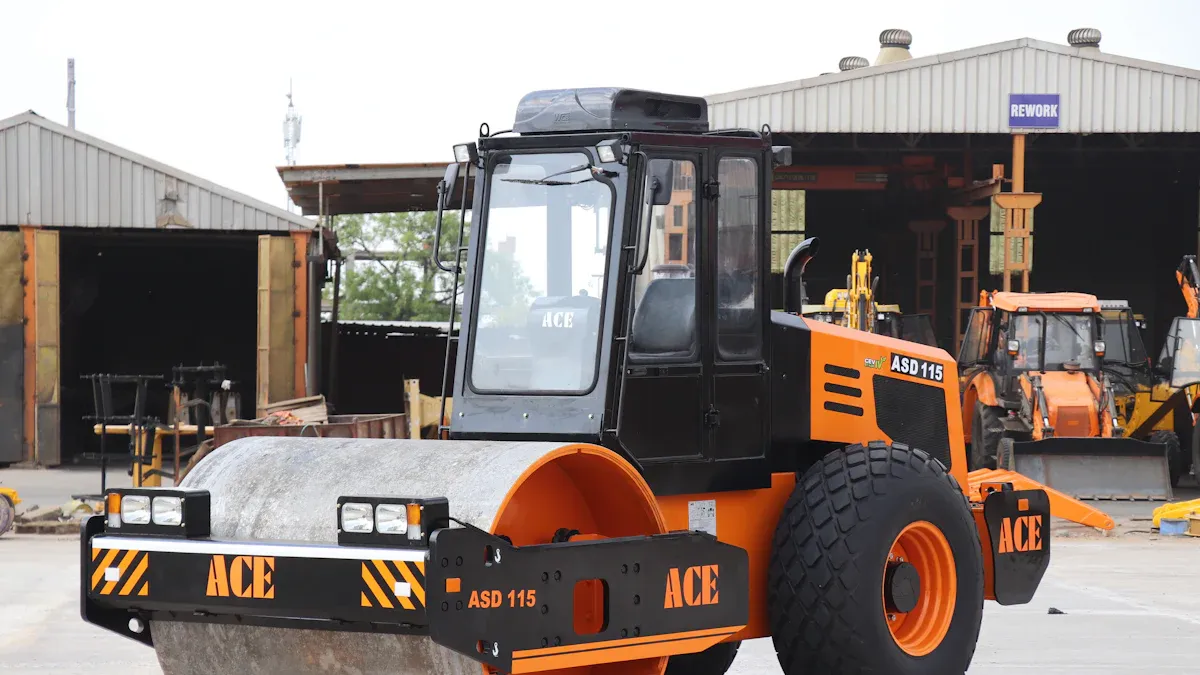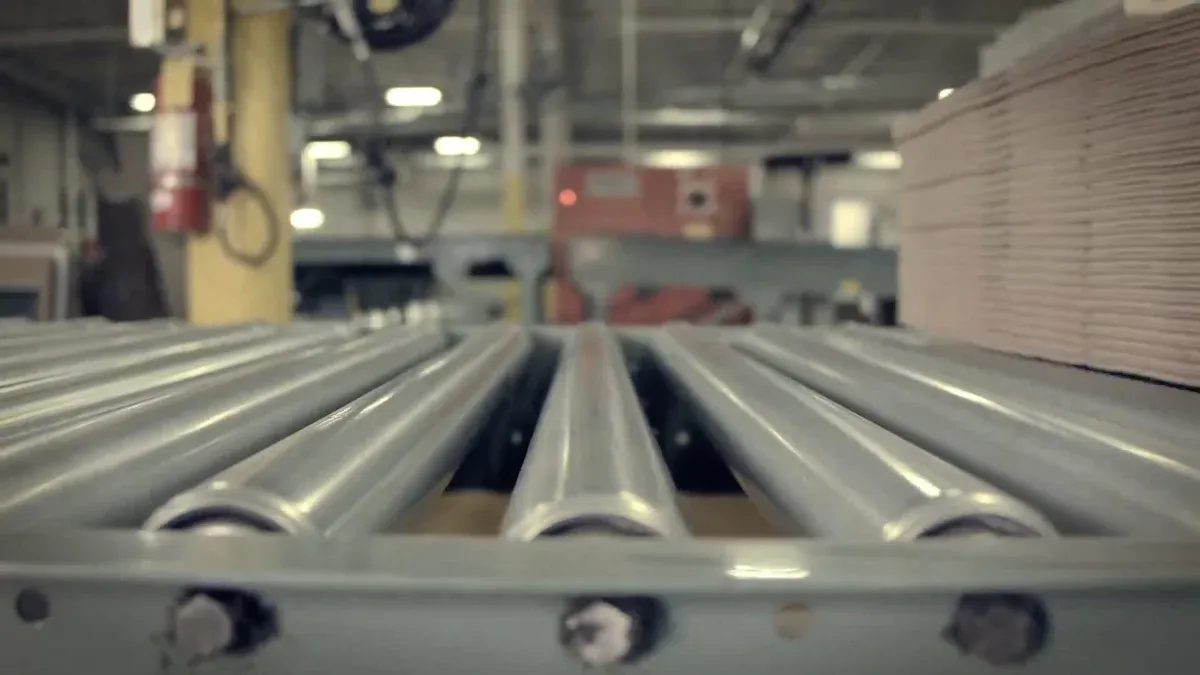
Many industries rely on the Силиконовый карбид ролик for daily operations. Steel, glass, ceramics, and electronics all use this tool. It shows strong durability, resists high heat, and stays stable in harsh chemicals.
- Key benefits: long life, high performance, and safe operation.
Key Takeaways
- Silicon carbide rollers offer exceptional durability and resist high temperatures, making them ideal for industries like steel, glass, ceramics, and electronics.
- These rollers resist chemical damage and thermal shock, reducing maintenance needs and downtime while improving product quality.
- Factories trust silicon carbide rollers to keep production lines running smoothly, ensuring safer, cleaner, and more efficient operations across many applications.
Silicon Carbide Roller in Steel and Metallurgy

Use in Continuous Annealing Lines
Steel plants use continuous annealing lines to heat and cool steel strips. These lines need rollers that can handle high temperatures and heavy loads. The silicon carbide roller works well in this setting. It supports the steel strip as it moves through the furnace. The roller does not bend or break easily. It keeps its shape even when the temperature changes quickly. This helps the steel strip stay flat and smooth.
Key Advantages in High-Temperature Environments
Steel production often takes place at temperatures above 1000°C. Many materials cannot survive these conditions. The silicon carbide roller stands out because it resists heat and does not react with the steel. It also does not wear down quickly. Workers do not need to replace the rollers often. This saves time and money. The roller also helps keep the furnace clean. It does not produce dust or flakes that could harm the steel.
Note: Using silicon carbide rollers can improve product quality and reduce downtime in steel plants.
Example: Hot Strip Mills
Hot strip mills use rollers to move and shape steel slabs. The silicon carbide roller handles the weight and heat from the red-hot steel. It keeps rolling smoothly, even after many cycles. This makes it a top choice for hot strip mills. Many steel companies trust these rollers to keep their lines running safely and efficiently.
Silicon Carbide Roller in Glass Manufacturing
Role in Float Glass Production
Float glass production creates flat glass sheets for windows, mirrors, and screens. The process needs rollers that can handle high heat and keep the glass surface smooth. Silicon carbide rollers move the hot glass along the line. They do not bend or warp, even when the temperature rises above 1000°C. Workers rely on these rollers to keep the glass flat and free from marks.
Benefits for Surface Quality and Durability
Glass makers want a perfect surface. Any scratch or dent can ruin a sheet. Silicon carbide rollers have a hard, smooth surface. This helps prevent damage to the glass. The rollers also last a long time. They resist wear and do not react with chemicals in the glass. This means fewer replacements and less downtime for the factory.
Tip: Using silicon carbide rollers can help factories produce more glass with fewer defects.
Example: Flat Glass Tempering Furnaces
Flat glass tempering furnaces heat glass sheets to make them stronger. The rollers inside must work at high temperatures and support heavy loads. Silicon carbide rollers keep the glass moving smoothly through the furnace. They help the glass cool evenly, which makes it stronger and safer for use in buildings and cars.
Silicon Carbide Roller in Ceramic Tile Firing

Application in Roller Kilns
Ceramic tile factories use roller kilns to fire tiles at high temperatures. These kilns need strong rollers to move tiles through the heating zone. The silicon carbide roller supports each tile as it travels along the kiln. Workers rely on these rollers because they do not bend or lose shape. The rollers help keep tiles flat and prevent warping. This process ensures that each tile comes out with a smooth surface and even thickness.
Resistance to Thermal Shock and Chemical Attack
Roller kilns heat up and cool down quickly. Many materials crack or break under these changes. Silicon carbide rollers resist thermal shock. They stay strong even when the temperature changes fast. Factories also use glazes and chemicals during tile production. Some rollers react with these chemicals and wear out. Silicon carbide rollers resist chemical attack. They last longer and need fewer replacements.
Note: Choosing the right roller can reduce waste and improve product quality in tile manufacturing.
Example: Large-Scale Tile Production
Large factories produce thousands of tiles every day. They need equipment that works without stopping. Silicon carbide rollers keep the kiln running smoothly. They support heavy loads and handle long hours of use. Many tile makers choose these rollers for their strength and reliability. This choice helps factories meet high production goals and deliver quality tiles to customers.
Silicon Carbide Roller in Powder Metallurgy
Use in Sintering Furnaces
Powder metallurgy uses sintering furnaces to create strong metal parts from fine powders. These furnaces reach very high temperatures. Workers need rollers that can handle this heat without losing shape. The silicon carbide roller supports metal parts as they move through the furnace. It does not bend or crack under heavy loads. This roller keeps the parts steady during the heating process.
Consistent Performance at Elevated Temperatures
Many materials fail when exposed to extreme heat. The silicon carbide roller keeps working even when the temperature rises above 1200°C. It does not react with metal powders or gases inside the furnace. This roller also resists wear and does not produce dust. Factories can run their furnaces longer without stopping for maintenance. This helps save time and money.
Tip: Choosing the right roller can improve the quality of metal parts and reduce waste in powder metallurgy.
Example: Metal Component Manufacturing
Factories use powder metallurgy to make gears, bearings, and other metal parts. These parts must be strong and precise. The silicon carbide roller helps keep each part in the correct position during sintering. It supports both small and large components. Many manufacturers trust this roller for its strength and reliability. They know it will help them produce high-quality metal parts every day.
Silicon Carbide Roller in Electronics and Semiconductor Processing
Application in Wafer Processing Lines
Electronics factories use wafer processing lines to make computer chips and other devices. These lines need rollers that can move delicate wafers without causing damage. The silicon carbide roller supports each wafer as it travels through high-temperature steps. Workers trust these rollers because they do not scratch or chip the wafers. The rollers also help keep the wafers flat and steady during processing.
Clean Operation and Dimensional Stability
Cleanliness is very important in semiconductor production. Dust or particles can ruin a wafer. The silicon carbide roller does not shed dust or flakes. It has a smooth surface that stays clean even after many uses. This roller also keeps its shape at high temperatures. It does not bend or warp, so the wafers stay in the correct position. Factories can count on these rollers for precise and repeatable results.
Tip: Using clean and stable rollers helps reduce defects in electronic parts.
Example: Silicon Wafer Annealing
Silicon wafer annealing heats wafers to improve their quality. The process needs rollers that can handle both heat and delicate materials. The silicon carbide roller moves the wafers through the furnace without causing cracks or marks. Many electronics companies choose these rollers for their reliability and clean operation. This choice helps them make better chips and devices.
Silicon Carbide Roller in Heat Treatment Furnaces
Role in Conveying and Supporting Loads
Heat treatment furnaces play a key role in many factories. These furnaces use rollers to move heavy metal parts through high temperatures. A silicon carbide roller supports each load as it travels inside the furnace. The roller keeps the parts steady and helps them move smoothly. Workers trust these rollers because they do not bend or lose shape under pressure. This support helps prevent damage to the metal parts during the heating process.
Longevity in Repeated Thermal Cycling
Furnaces heat up and cool down many times each day. Many materials crack or wear out from these changes. The silicon carbide roller stands out for its ability to last through repeated thermal cycling. It resists cracking, even when the temperature changes quickly. This long life means factories do not need to replace rollers often. Less downtime leads to more efficient production.
Tip: Choosing the right roller can help factories save money and reduce maintenance needs.
Example: Automotive Parts Hardening
Automotive factories use heat treatment to make car parts stronger. During hardening, parts move through the furnace on rollers. The silicon carbide roller supports these parts at high temperatures. It keeps them in the correct position and helps them cool evenly. Many car makers choose this roller for its strength and reliability. This choice leads to safer and longer-lasting car parts.
Silicon Carbide Roller in Chemical Processing
Use in Corrosive Environments
Chemical plants often use strong acids and bases. These substances can damage most materials. Workers need equipment that can last in these harsh settings. The silicon carbide roller stands up to these tough conditions. It does not break down when exposed to chemicals. This roller keeps moving products through the process, even when other materials fail.
Superior Chemical Resistance
Many rollers lose strength or shape after contact with chemicals. The silicon carbide roller resists both acids and alkalis. It keeps its surface smooth and strong. This resistance means fewer replacements and less downtime. Factories can trust these rollers to keep working, even in the most demanding environments.
Note: Choosing the right roller helps protect both equipment and products from chemical damage.
Example: Acidic or Alkaline Processing Lines
Some factories use processing lines that handle very acidic or alkaline solutions. These lines need rollers that will not react or wear out quickly. The silicon carbide roller supports bottles, pipes, or sheets as they move through these lines. Workers see fewer breakdowns and less contamination. This choice helps factories keep their products safe and their lines running smoothly.
Silicon Carbide Roller in Food Processing
Application in High-Temperature Baking Ovens
Food factories often use baking ovens that reach very high temperatures. These ovens bake bread, pastries, and other foods quickly. The rollers inside must handle both heat and heavy trays. A silicon carbide roller works well in these ovens. It keeps its shape and strength, even after many baking cycles. Workers can trust these rollers to move food products smoothly through the oven. The roller does not warp or break, so the baking process stays safe and efficient.
Non-Contaminating and Easy to Clean
Cleanliness is very important in food processing. Any dirt or particles can spoil the food. The surface of a silicon carbide roller stays smooth and does not flake. Workers can clean these rollers easily. They do not absorb oils or food particles. This helps prevent contamination and keeps the food safe. Many food factories choose these rollers because they meet strict hygiene standards.
Tip: Regular cleaning of rollers helps maintain food quality and safety.
Example: Industrial Bread Production
Large bakeries produce thousands of loaves every day. They need equipment that works without stopping. Silicon carbide rollers help move bread dough through hot ovens. The rollers support heavy trays and keep the bread moving at the right speed. Bakeries see fewer breakdowns and less waste. These rollers help deliver fresh bread to stores and customers on time.
Silicon Carbide Roller in Solar Panel Manufacturing
Use in Glass and Wafer Handling
Solar panel factories handle large sheets of glass and delicate wafers every day. Workers need equipment that can move these materials without causing chips or cracks. The silicon carbide roller supports both glass and wafers as they travel through high-temperature ovens. These rollers do not bend or lose shape, even when the process gets very hot. They help keep the glass flat and the wafers safe from damage.
Precision and Cleanliness for Sensitive Materials
Solar panels require clean and precise parts. Any dust or dirt can lower the panel’s performance. The surface of a silicon carbide roller stays smooth and does not shed particles. This helps keep the production line clean. The roller also holds its size and shape, which means each glass sheet and wafer stays in the right position. Factories see fewer defects and higher quality panels.
Tip: Clean rollers help solar panel makers avoid costly mistakes and improve product quality.
Example: Photovoltaic Module Assembly
During photovoltaic module assembly, workers join glass, wafers, and other layers to make a solar panel. The silicon carbide roller moves each layer through the assembly line. It supports the weight and keeps everything lined up. Many solar panel companies choose these rollers for their strength and reliability. This choice helps them build panels that last longer and work better in the field.
Silicon Carbide Roller in Textile Industry
Application in Heat-Setting and Dyeing Machines
Textile factories use heat-setting and dyeing machines to treat fabrics and fibers. These machines often reach high temperatures. Rollers inside the machines must handle both heat and chemicals from dyes. A silicon carbide roller works well in this environment. It supports fabric as it moves through the machine. The roller does not bend or lose shape, even when exposed to heat or moisture. Workers rely on these rollers to keep fabric flat and smooth during processing.
Smooth Operation and Wear Resistance
Smooth operation is important in textile production. Any rough surface can damage delicate fibers. The surface of a silicon carbide roller stays smooth after many uses. It does not wear down quickly. This helps prevent snags or tears in the fabric. The roller also resists chemicals from dyes and cleaning agents. Factories see fewer breakdowns and less maintenance. This leads to higher productivity and better fabric quality.
Tip: Choosing rollers with high wear resistance can help textile factories reduce waste and improve product consistency.
Example: Synthetic Fiber Processing
Factories that make synthetic fibers, such as polyester or nylon, use rollers to move fibers through heat-setting and dyeing steps. The silicon carbide roller supports these fibers at every stage. It keeps the fibers straight and prevents tangling. Many textile companies choose this roller for its strength and reliability. They know it helps them produce smooth, high-quality synthetic fabrics.
Comparative Summary: Silicon Carbide Roller vs. Alternative Materials
Performance Comparison
Factories often compare rollers made from different materials. Common options include steel, alumina, and quartz. Each material has strengths and weaknesses. The table below shows how these materials perform in key areas:
| Property | Steel Rollers | Alumina Rollers | Quartz Rollers | Silicon Carbide Rollers |
|---|---|---|---|---|
| Max Temperature (°C) | 600 | 1400 | 1100 | 1380 |
| Thermal Shock Resistance | Low | Medium | High | Very High |
| Chemical Resistance | Low | High | Medium | Very High |
| Wear Resistance | Medium | High | Medium | Very High |
| Lifespan | Medium | High | Medium | Very High |
Note: The best choice depends on the process, but many industries see better results with silicon carbide rollers.
Key Reasons for Industry Preference
Many factories choose silicon carbide rollers for several reasons:
- They длиться дольше than most other rollers.
- They work well at high temperatures.
- They resist damage from chemicals and thermal shock.
- They help reduce downtime and maintenance costs.
- They keep products clean and free from defects.
These advantages help factories improve product quality and save money. Workers trust these rollers to keep production lines running smoothly.
Silicon Carbide Roller supports many industries, including steel, glass, ceramics, and electronics. These rollers offer durability, thermal stability, and chemical resistance. Many factories choose them for operational efficiency.
Choosing the right roller helps companies improve product quality and reduce costs.
FAQ
What makes silicon carbide rollers better than steel rollers?
Silicon carbide rollers last longer and handle higher temperatures. They resist chemicals and wear. Many factories choose them for better performance and lower maintenance.
Can silicon carbide rollers be used in food processing?
Yes. These rollers do not contaminate food. Workers clean them easily. Food factories use them in high-temperature ovens for safe and efficient baking.
How often do factories need to replace silicon carbide rollers?
Most factories replace silicon carbide rollers less often than other types. Their durability and resistance to heat and chemicals help extend service life.


